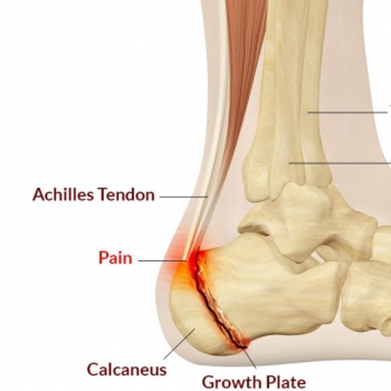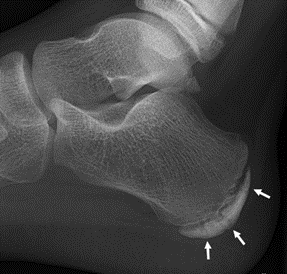Sever’s disease is a painful inflammatory condition affecting children and early adolescents relating to the growth plate in the heel bone (calcaneus).
What is Sever’s disease?
Sever’s disease, also known as calcaneal apophysitis, is the inflammation of the calcaneus from the growth plate caused by repetitive stress to the heel. It predominantly affects children aged between 8 and 12 as this is when the growth plate is very active.

Sever’s Disease Predisposing Factors
- – Participation in repetitive high impact sports and physical activity
- – Tight calves
- – Sub-optimal ankle range of motion
- – Flat feet
- – Lack of rearfoot control
- – Biomechanical pathology
Symptoms:
A child will complain of a sharp lingering pain under the heel during periods of physical activity and loading. It is important to note that typical signs of inflammation, such as swelling and redness, are absent in this condition.
 Diagnosis:
Diagnosis:
Upon presentation to your podiatrist a thorough medical history and patient interview will be taken. Diagnosis of Sever’s disease typically consists of a ‘squeeze test’ (medial-lateral compression of the calcaneus) with patients’ response being recorded. An accompanied foot radiograph will always be arranged to visualise the calcaneal growth plate and rule out any serious medical problems.
They are many conditions that affect the heel, so a precise diagnosis is paramount in providing optimal treatment outcomes and identifying more serious conditions.
Treatment:
Management of Sever’s disease is typically conservative as the pathology will resolve once full calcaneal growth is established. Without intervention pain can last for years and is strongly not advised as complications can arise from chronic inflammation.
Short-term Relief and Care at Home
Ice and rest to alleviate symptoms and avoid high impact loading to prevent painful flare ups.
Podiatric Treatment and Prevention
- Full biomechanical assessment to determine the cause of the Sever’s disease to prevent future pathology and further injury
- Calf muscle stretching and strengthening to support the ankle, relieve symptoms and promote performance
- Customised orthotics to correct biomechanics and compliment rehabilitation
- Footwear review and modification to compliment treatment
- Optimise skeletal alignment to protect the knees, hips, back and neck throughout growth
- Intrinsic rehabilitation of the foot to promote long-term foot health outcomes
- High powered laser to alleviate pain and inflammation
- Extracorporeal shockwave therapy to relieve tight calves, evertors, invertors and plantar fascial bands and restore range of motion
Long-term Health Outcomes, Alleviation of Painful Symptoms, Increased Performance and Prevention of Future Injury
A parent’s role:
As a parent it is important to monitor your child’s walking and activity as this can be a tell-tale sign that there may be problems with their feet, knees or hips. There is always a reason if your child is limping, not participating in play/sports or complaining of pain. Early assessment and intervention should always be sought to minimise injury and prevent further complication.
Things to look your for in your child
- Trouble balancing
- Flat or high arches
- Feet facing inwards or outwards
- An unusual walking/gait pattern
- Inability to perform basic movements such as skipping or jumping
- Abnormal colour or presence of swelling feet or legs
AMA Podiatry has a long history in Children’s Podiatry assessment and early childhood development. Your pediatric podiatrist has a strong commitment to quality patient care with a holistic approach, our dedicated team review your child through walking, range of motion, gait difficulties and balance and coordination assessment.
Some Conditions do normally outgrow themselves; other conditions require some form of intervention. Combined with advice from the parent and associated health care provider we formulate a treatment plan for your child. Alex Adam is the chief Pediatric Foot Doctor for the southeast corridor of Melbourne and the city of Kingston Maternal Health for the past eight years.
From your child’s initial assessment, your Pediatric Podiatrist will advise you of the best management plan for your child’s feet.
Goals and outcomes are developed in consultation with both your child and family in mind.
More Information or Make a Booking
For more information on how we can help you, please call us on 9576 9495 or complete our enquiry form: Enquiry Form

